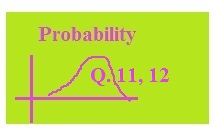Q.1 – Q.2 , Q.3 – Q.4 Q.5 , Q.6 , Q.7 , Q.9 , Q. 10 , Q. 11 Q.12 , Q.13 , Q. 14 , Q. 15 Q.16 to Q. 19
Answer 11.
All positive 2 digit integers are 10 to 99 ; total 90 integers
4 in tens place will be 40 , 41 , 42 , …………49 ; total 10 integers
(a).
the probability of a 4 in tens place P(M) = 10/90
P(M) =1/9
(b).
at least one 4 at unit place
4 at units place will be ; 14, 24, 34, 44, 54, 64, 74, 84, 94
Total 9 options available for 4 at unit place
Probability of 4 at unit place P(N) = 9/90 = 1/10
So , Probability of at least one 4 in tens place or the unit place
Here both the event are independent to each other
P (M∪N) = P (M) + P (N) – P(M)P(N)
= 10/90 + 9/90 – (10/90) x (9/90)
= 1/9 + 1/10 – (1/9 x 1/10)
= 19/90 – 1/90
= 18/90
P (M∪N) = 1/5
( c ).
No 4 at unit or tens place
Probability of not having ‘4’ at unit or tens place = 1 – 1 / 5
= 4/5
Answer 12
Probability of defective parts = P(M) = 2/10
= 1/5
( a ).
Probability of choosing one part which is not defective = 1 – P ( M )
= 1 – 1/5
= 4/5
Or
Out of 10 there are 2 defective , means 10 – 2 = 8 are not defective
So, Probability of choosing one part which is not defective = 8/10
= 4/5
( b )
Probability of taking part which is defective P ( M ) = 2/ 10 = 1 / 5
Now the part is not replaced , so there are only 10 – 1 = 9 parts are available for next choice and there are only 2 defective parts
So, Probability of taking second part which is defective P (N) = 1/9
P(M) and P (N ) = 1/5 x 1 /9
= 1/45
Q.1 – Q.2 , Q.3 – Q.4 Q.5 , Q.6 , Q.7 , Q.9 , Q. 10 , Q. 11 Q.12 , Q.13 , Q. 14 , Q. 15 Q.16 to Q. 19
<<<<PREVIOUS PAGE >>>>> NEXT PAGE
